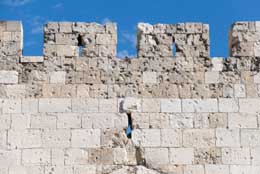15 August 2012
 The ravages of war often portrayed in images of the burned out and blasted shells of cities may well be more than just a visual emblem of devastation.
The ravages of war often portrayed in images of the burned out and blasted shells of cities may well be more than just a visual emblem of devastation.
In this year’s annual Nelson Mandela Lecture, presented by the University of South Australia’s Hawke Centre and its School of Law, featured presenter Professor Eyal Weizman will examine the place of urban architecture as a source of evidence in the pursuit of truth surrounding significant conflicts.
Professor of Visual Cultures and Director of the Centre for Research Architecture, Goldsmiths, University of London, Prof Weizman will present Walls and wars, rights and ruins: the revelations of forensic architecture, on September 5 at the Allan Scott Auditorium, City West campus, 5.30pm for a 6pm start.
Prof Weizman will examine World War II, the Guatemalan civil war in the 1980s, Palestine, Gaza in 2008, Darfur and Yugoslavia, and how these conflicts have registered in their built environments in different and distinctive ways.
He says architectural analysis allows us to see a different dimension of war and to bring the findings to bear as evidence in the pursuit of truth.
“With the benefit of new technologies and novel forms of spatial analysis we are able to effectively query the function of space as evidence within the different forums of international justice,” Prof Weizman says.
“Geospatial data, maps and models of cities and territories, the ‘enhanced vision’ of remote sensing, 3D scans, air and ground sampling and high-resolution satellite imagery redraw the surface of the earth in variable resolutions from the bottom of the sea-bed to the remnants of bombed-out buildings.
“Using these tools, forensic architecture enhances our understanding of human conflict and assists the pursuit of international justice.”
Currently leading a major European Research Council-funded project, Forensic Architecture - the place of architecture in international humanitarian law, he says the project is attempting to transform the built environment from an illustration of alleged violations to a source of knowledge about them and a resource through which controversial events and political processes could be reconstructed, analysed and better understood.
“Because violations of international humanitarian law and human rights conventions are frequently undertaken in cities and by means that deliberately manipulate the elements that constitute their built fabric, this project contends that organisations using human rights frameworks can benefit from a closer engagement with the operational procedures, assumptions, methodologies, and technologies of urban and architectural analysis,” Prof Weizman says.
“Legal claims of the kind that are brought to international courts and tribunals often invoke images of destroyed buildings or of menacing new constructions, but these are too often treated merely as illustrations of atrocity.
“Our current research project is driven by the introduction of a new concept – ‘Forensic Architecture’ – which is proposed as a field of practice and as an analytical method for probing the political and social histories inscribed in spatial artefacts and in built environments.
“The project section of website, www.forensic-architecture.org, gives other examples of how we are pushing the boundaries with our research.”
Director of the Bob Hawke Prime Ministerial Centre, Elizabeth Ho, says she is delighted to be presenting this lecture in conjunction with the School of Law.
“We’re delighted to have Prof Weizman presenting the fourth UniSA Nelson Mandela lecture, which this year is a part of Place 2012, a season of architecture, art, and design, to be held throughout South Australia this spring,” she says.
“Prof Weizman has worked with a variety of NGOs worldwide and was a member of B'Tselem board of directors. He is currently on the advisory boards of the Institute of Contemporary Arts in London and the Human Rights Project at Bard in New York, as well as other academic and cultural institutions.
“This lecture is an excellent opportunity to hear from one of the world’s experts in this fascinating field.”
Go online to register to attend and find out more information about the lecture.
Michèle Nardelli office 08 8302 0966 mobile 0418 823 673 email michele.nardelli@unisa.edu.au



